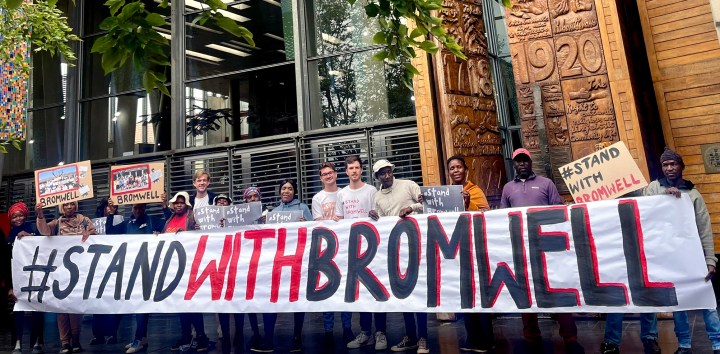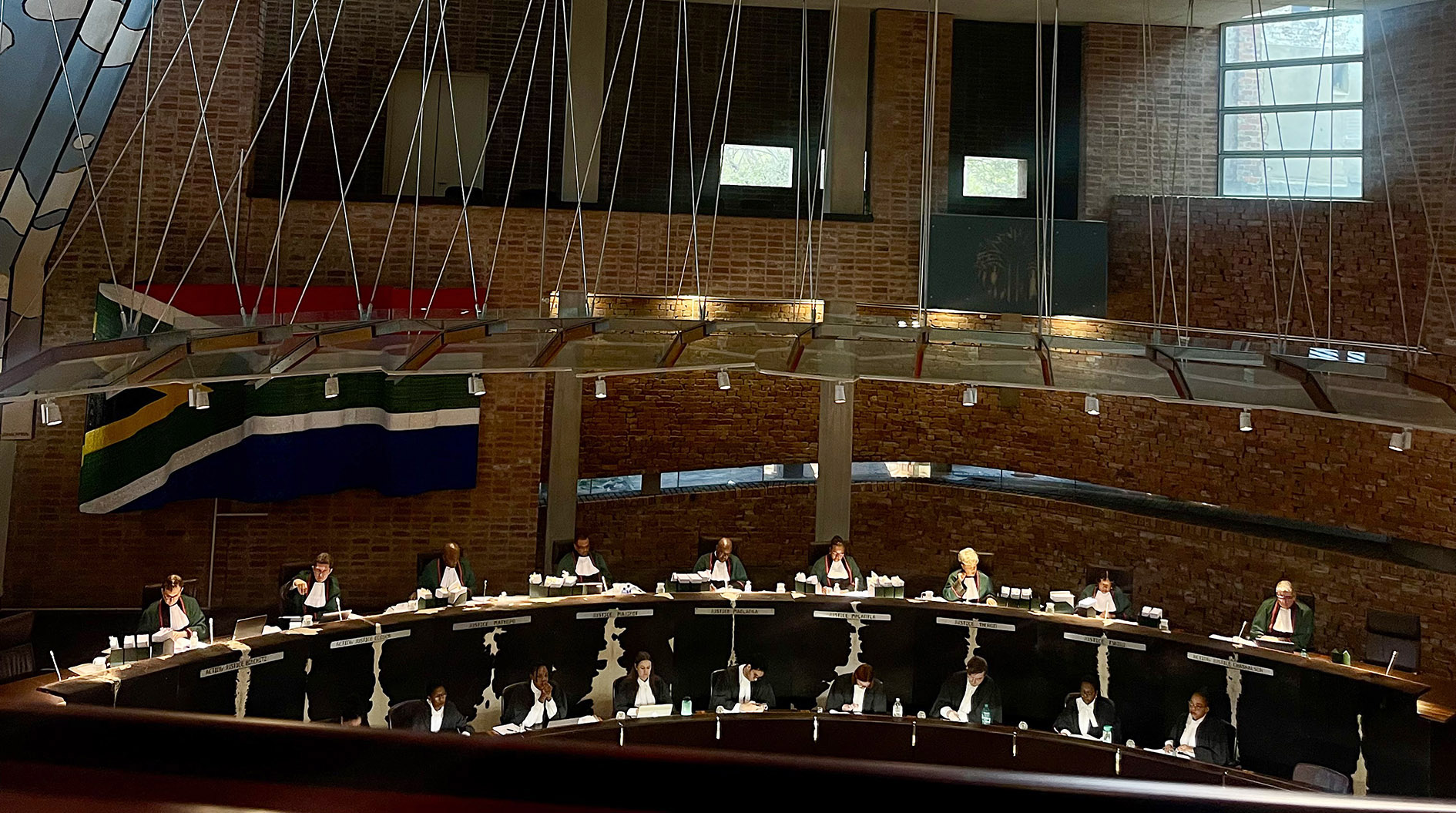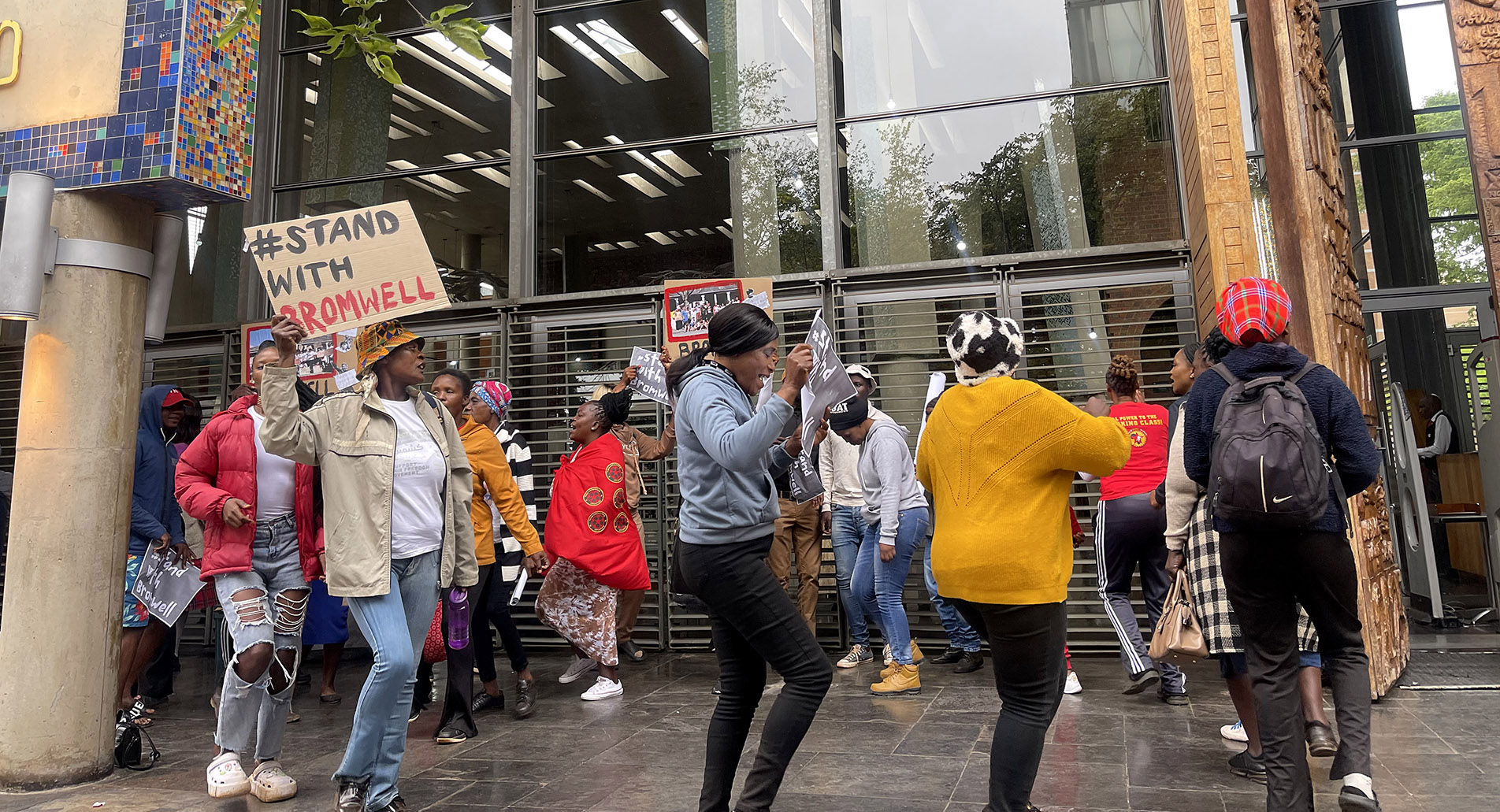FIGHT FOR HOUSING
Bromwell Street evictions — ConCourt justices raise spectre of ‘spatial apartheid’ and ‘District Six form of displacement’

On Tuesday, the long-standing residents of Bromwell Street in Cape Town’s city centre approached the Constitutional Court to appeal the decision to evict them and relocate them to the outskirts of the city.
‘This was not a case where these families or these individuals were being evicted because of nonpayment of rent, or because they have occupied a building that is in a decrepit state and are being evicted for health and safety reasons,” Sheldon Magardie told the Constitutional Court on Tuesday.
“The only reason, and one reason alone, underpinned their eviction. Their homes, which were their ancestral homes, had been bought in 2013 by the Woodstock Hub for a sum of approximately just over R3-million for four cottages that are approximately 800 square metres.”
He was speaking as oral arguments were heard in the matter of Charnell Commando & Others v The Woodstock Hub & the City of Cape Town.
At the heart of the case is the constitutionality of the City of Cape Town’s housing programme and its actions in responding to the emergency housing needs of people evicted into homelessness, since its housing policy does not provide temporary emergency accommodation in the inner city.
Magardie said the Bromwell families have lived in their homes for generations, and now face eviction into homelessness as the Woodstock Hub wants to convert the property into rental apartments for the middle-income market.
Before the eviction order, the monthly rent for Bromwell residents was between R300 and R2000. However, since the property was sold to the Woodstock Hub in 2014, it is significantly higher, ranging from R5,000 to R9,000.
The socioeconomic context in Cape Town during that time was critical, said Magardie.
“In 2016, the undisputed evidence is that not only was Cape Town one of the most spatially divided cities in the country, but it was in the middle of one of the worst housing affordability crises in the world,” he said.
In 2016, in terms of year-on-year property price increases, Cape Town ranked third in the world behind Shanghai and Vancouver.

After hearing from the City of Cape Town’s legal representative, Karrisha Pillay, Justice Mbuyiseli Madlanga asked if this was not ‘a refined modern-day type District Six form of displacement’ as poor people were being driven away from the inner city. (Photo: Takudzwa Pongweni)
Magardie said the Bromwell Street residents found themselves in a position of housing insecurity and that the City of Cape Town was then approached for help.
How the City responded “is indicative of [its] unreasonable approach throughout this litigation”.
After having been made aware that the families would be rendered homeless on eviction, the City denied it had an obligation to provide the families with emergency housing, saying that the eviction was a “private eviction” which was “just and equitable”, which precipitated the launch of the matter on 20 September 2016.
From 2017 to 2020, the Bromwell families and the City argued in the Cape Town High Court. During that time the City offered emergency accommodation. However, all the options would relocate the residents to distant and underresourced temporary relocation areas such as Blikkiesdorp, “incremental development areas” such as Wolwerivier (a desolate settlement 25km from Cape Town), or existing informal settlements on the outskirts of the city such as Mfuleni and Kampies.
Read more in Daily Maverick: Wolwerivier Emergency Housing Camp is hell on Earth, 32km from heart of Cape Town
Magardie said relocation to underresourced areas would compound the vulnerability of the residents – a replication of spatial apartheid – and that City’s policy position that emergency housing is not provided in the inner city had an exclusionary effect.
The background
On 6 September 2021, judgment was granted in favour of the Bromwell residents, declaring the City of Cape Town’s emergency housing programme and implementation of it, unconstitutional and ordering the City to provide temporary emergency housing and/or transitional housing to the residents in a location as close as possible within the Woodstock, Salt River and the inner city precinct.
Read more in Daily Maverick: Cape Town’s emergency housing programme is ‘arbitrary’ and unconstitutional, says court
The City subsequently sought leave to appeal at the Supreme Court of Appeal (SCA), and this was heard on 14 November 2022.
On 6 February 2023, the SCA set aside the declaration on unconstitutionality made by the Western Cape Division of the High Court, but ordered the City to provide the residents with emergency accommodation in a location as close as possible to where they currently reside. Ndifuna Ukwazi, which represents the residents, filed an application to challenge the SCA ruling.
Magardie said the SCA erred in overlooking spatial justice and spatial apartheid in its assessment of the City’s emergency housing offers to the Bromwell families and the exclusion of inner-city areas in Cape Town as viable options for emergency housing.

Housing activists and Bromwell Street residents outside the Constitutional Court in Johannesburg on 27 February 2024. (Photo: Takudzwa Pongweni)
The City’s argument
The City’s legal representative, Karrisha Pillay, told the Constitutional Court that the City accepted that it bore an obligation to provide alternative accommodation and had accordingly made certain offers of emergency accommodation to Bromwell’s residents.
She added that the City did everything it could, engaged with the residents, and offered emergency accommodation, but the residents turned down each suggestion.
Pillay said there were compelling reasons that the City does not deliver emergency housing in the inner city. These included:
- The excessively high costs of developing emergency housing in the city;
- The very high rates on properties in the city centre;
- The scarcity of land in the immediate surrounds of the city and the competing demands on such land; and
- There are other housing programmes in which the immediate surrounds of the city are being targeted. These are aimed at creating affordable inner-city housing and temporary housing projects to facilitate the provision of such housing.
If the court rules against the City it could affect how every municipality manages emergency housing policies around the country, said Pillay.
“Given the finite and limited availability of land in the inner city, the City would have to reduce or even cease delivering certain permanent housing in the inner city and replace those developments with emergency housing,” she said.
Pillay said no legislation, policy or programme requires the City to deliver housing in a particular area, and the City’s implementation of the Housing Act or Housing Code cannot be seen as being unconstitutional.
Judges pose questions
Justice Leona Theron repeatedly challenged Magardie to point out precisely which policy or programme was unconstitutional. Since the court was dealing with applicants who could become homeless due to a policy of the City, should the applicants not apply for relief to declare that policy as unconstitutional?
Magardie said there was no single document.
Abahlali baseMjondolo was admitted as amicus curiae (friend of the court) and was represented by Jason Brickhill from the Socio-Economic Rights Institute of South Africa (SERI).
Brickhill said there was nothing unusual about a policy not being written down and “it would be perverse” if the government could avoid legal scrutiny by not writing down policies that would affect vulnerable people.
Brickhill said this matter was of great importance as large metropolitan municipalities seem to be implementing policies that resemble apartheid spatial planning and replicate apartheid-era displacement of poor residents to the outskirts of the city centres.
Acting Justice David Blichitz said there appeared to be a gap in the legal framework.
“There is emergency accommodation which is temporary in nature, there is social housing for which the applicants do not qualify. What happens to people in the position of the applicants who need more permanent housing and cannot afford social housing?”
Magardie said that the simple answer was that they were excluded. Only three members of the Bromwell families were offered social housing, which is low-income permanent housing. The rest did not meet the income threshold of about R1,500.
Acting Justice Matthew Chaskalson said the court was dealing with people who were only evicted because of consequences of a City policy, as the City had designated Woodstock and Salt River as priority urban development zones, something the City knew, and admitted, would trigger displacement.

Housing activists and residents of Bromwell Street gather outside the Constitutional Court in Johannesburg on 27 February 2024. (Photo: Takudzwa Pongweni)
Chaskalson said that although the City had repeatedly acknowledged the need to mitigate the displacement of residents who would be displaced because of its policy, it was not clear what it had done to mitigate this.
“This particular community is one of a very small handful of communities that managed actually to survive apartheid intact in a white area.”
He noted the “irony” that in “a post-apartheid democratic society” they are being evicted “in the interest of urban regeneration”, and linked this to the issue of spatial apartheid in Cape Town.
Justice Mbuyiseli Madlanga asked Pillay if this was not “a refined modern-day type District Six form of displacement”.
“The effect of what is happening because of the lack of provision of emergency housing is that the poor, which is exactly what happened in District Six, Sophiatown, are being driven away from the inner city,” he said.
Pillay said she did not want to undermine the predicament of the poor in the country, and that policy has to be reasonable and cater to these demands.
‘Important day’
Disha Govender, attorney for the Bromwell families, said it was an important day and could set a precedent for how the City of Cape Town and other municipalities respond to emergency housing.
Nomzamo Zondo, the executive director of SERI, said it was important that the court brought us back to the history and the issue of preserving housing rights, especially housing that withstood apartheid.
“The court was clear on things like what it means to ask for an extra R10 from a poor person, what it means about their enjoyment of social networks, things that people normally would not count, so it was good to hear that,” she said.
Charnell Commando, the lead applicant in the case, said the judges posed good questions and the references to District Six made her very emotional.
“Because of what our people went through, and are still going through today, because it is the same thing that is happening. Nothing has changed and people are still being removed to the outskirts,” she said.
Judgment was reserved. DM





















 Become an Insider
Become an Insider
So sad too bad
Nothing has changed….. really Charnell, what utter tosh.
I assume the people being evicted were not the ones that sold the properties for R3m – not clear from article. Their landlord sold the properties they were renting? So their ancestral homes were not theirs, they had been renting them for generations?
I can’t understand why there is still so much centrally located land standing vacant in district six or the technikon surrounds. Why is that not taken over by City for low cost housing? Housing is upside down. I know working families that are on waiting lists since 2002 and living in backyard shacks, yet councils offer social housing / emergency housing for other people. There should be an orderly queue for state housing.
Because the so-called “affected parties” are still bickering over who’s entitled and who’s not
The area of District 6 is empty because Nelson Mandela had committed the government to not “lay a single brick” until all those who were displaced (and their descendants) had an opportunity to return to their home. The government has failed to do this
Hahahahaha
Cape Town City owned rental properties all over the city – I wonder what happened to them. Gentrification at any cost – District 6 thinking all over again.
Nonsense
The sense of entitlement in this country is unparalleled, everyone thinks that they deserve a house, job or a state pension. These people were renting, that is the bottom line. Get out and go find somewhere else to rent!!!
Housing is a constitutional right Lew. A right that was agreed upon and adopted following the end of Apartheid
Not for free it’s not
Surprisingly Zimbabwe offers the best property investment opportunities that is if you can afford the prices there. Malawi too. Nothing like inclusive housing etc. Just good old economics.
I am not sure I understand the resident’s argument. This is a private matter between them and their landlords. How on earth is the city responsible for them? This is entirely apart from the role they played in Mugabe’s impunity – the perfect role model for Zuma. A man who stole his country blind, ruled with an iron fist for decades and never suffered any sort of consequence for his actions. I can see Zuma wanting to emulate that.